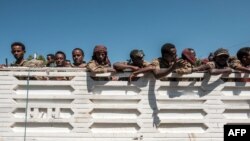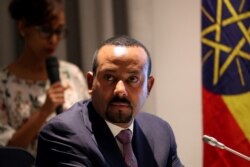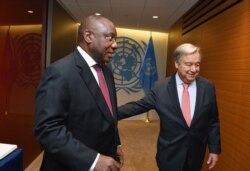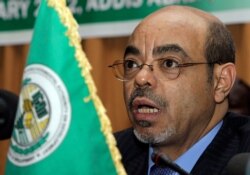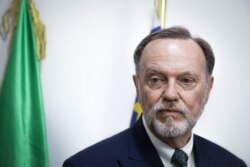Ethiopia’s prime minister has rejected calls for dialogue to end an internal conflict that has already killed hundreds and displaced more than 40,000 people in the key U.S. ally in East Africa — a stance that has alarmed diplomats from Addis Ababa to Washington about the potential for escalating conflict.
On Wednesday, Prime Minister Abiy Ahmed — who last year was granted a Nobel Peace Prize for his efforts in ending a long-simmering conflict between his country and neighboring Eritrea — released a statement addressed not to his actual opponents, the Tigray People’s Liberation Front (TPLF), but to the international community.
“As a sovereign state, Ethiopia has every right to uphold and enforce its own laws within its own territory,” Abiy said of the conflict that started in early November when the TPLF attacked federal forces. “And that is exactly what we are doing.”
Also this week, Abiy’s predecessor penned a provocative statement in Foreign Policy magazine, rejecting regional and international calls seeking dialogue. Abiy’s office quickly retweeted large chunks of the article, titled, “Ethiopia’s Government and the TPLF Leadership Are Not Morally Equivalent.”
“I truly believe,” former Prime Minister Hailemariam Desalegn wrote, “that most people recommending this approach” — meaning dialogue and negotiation — “are well-intentioned outsiders who are merely echoing the conventional wisdom of how one should resolve conflicts in Africa.”
Diplomats publicly urge dialogue
The three-week-old crisis between the federal government and armed officials in the Tigray region has already alarmed diplomats around the world, who have almost unanimously urged the young prime minister to resolve it peacefully. Officials at the State Department — both current officials and those who will represent U.S. policy under President-elect Joe Biden — continue to publicly urge dialogue.
“I’m deeply concerned about the risk of violence against civilians, including potential war crimes, in the fighting around Mekelle in Ethiopia,” Jake Sullivan, Biden's choice for national security adviser, tweeted on Wednesday.
Ethiopia’s Human Rights Commission on Tuesday issued a preliminary report alleging at least 600 people had been killed in the Tigray region town of Mai-Kadra on November 9, echoing similar findings by a November 12 Amnesty International report.
“Both sides should immediately begin dialogue facilitated by the AU [African Union],” said Sullivan.
The 55-body organization is headquartered in Addis Ababa. Last week, AU President Cyril Ramaphosa, who is also South Africa’s president, named three former African heads of state as high-level envoys to try to mediate for the AU.
U.N. Secretary-General Antonio Guterres on Wednesday echoed his support for the AU mediation efforts.
“The secretary-general reiterates the full support of the United Nations to the initiative of the chairperson of the African Union, President Cyril Ramaphosa of South Africa, to facilitate peaceful solutions,” said spokesman Farhan Haq. “He urges all parties to seize this opportunity to de-escalate tensions.”
Ben Rhodes, the longest-serving member of former President Barack Obama’s foreign policy team, and Sullivan’s co-chair at National Security Action, a political NGO, agreed on the importance of dialogue.
“Hard to overstate the danger of continued escalation in Ethiopia,” he said. “The coming weeks will be enormously consequential. Hopefully, Ethiopians internalize this message and de-escalate from the current course — dialogue is an available option.”
Their calls have been echoed by the U.S. State Department’s Assistant Secretary for African Affairs Tibor Nagy, who last week said: “At a point where mediation will become useful — i.e., that the two parties indicate an interest in mediation — you can bet that the United States would be there in an instant. ... At this point, neither party, from everything we hear, is interested in mediation.”
‘Long and proud history’
But, as Abiy and Hailemariam point out, Ethiopia’s history is a long and complex one, in which power has long been dominated by groups from the Amhara and Tigray regions. Abiy, a member of the majority Oromo group, and the first Oromo to occupy a position of such importance, has tried to redress that imbalance since he took office in 2018.
And so Abiy’s statement began, tellingly, with the declaration that “Ethiopia is a country with a long and proud history of statehood.” It is, as Ethiopian officials are wont to point out, the only African nation never to have been colonized, and was a founding member of the AU and of the U.N.
In both recent and ancient history — from the 1896 battle of Adwa, in which Ethiopian forces soundly defeated Italian forces, thus preventing them from staking a colonial claim, to the forceful sentiments of former Prime Minister Meles Zenawi that Ethiopia was “not the West’s whipping boy” — the East African nation has stood firm and proud against foreign interference.
But the internal dynamic is more complicated, says analyst Ahmed Soliman, a researcher from London-based Chatham House.
“The divisions within Ethiopia — political and ethnic — have extremely deep roots,” he told VOA. “There are structural issues here that really haven't been sufficiently addressed, while I recognize there hasn’t been time to sufficiently resolve them so far, given the number of other competing priorities during the last few years.”
Meles himself was born in the Tigrayan city of Adwa, and was a member of the 1991 force that swept into the capital and deposed the military junta that ran the country. His government established the ruling Ethiopian People's Revolutionary Democratic Front, which incorporated key leaders from the TPLF. He served from 1991 until his death in 2012.
His long tenure taught TPLF leadership how to market themselves to the international community, Hailemariam argues in his Foreign Policy article.
“A TPLF-dominated coalition ruled Ethiopia shrewdly for 27 years,” Hailemariam writes. “After being forced to give up the reins of power due to popular protests against our economic and political mismanagement — which I was a part of — the TPLF leadership designed and is now executing a strategy meant to capitalize on the propensity of the international community to fall into its default mode of bothsidesism and calls for a negotiated settlement. The TPLF’s leaders are savvy operators who know how susceptible the international community is to such manipulation."
“I think Hailemariam is echoing the federal government’s position," Soliman said, "which is that they’re not negotiating with the TPLF as they are a criminal element that needs to be removed to restore the constitutional order.”
What the TPLF is thinking remains unclear. A communications blackout and travel restrictions have made it difficult for anyone to verify its claims. Nagy, a former ambassador to Ethiopia who holds an honorary doctorate from the University of Mekelle, which is in Tigray’s capital, postulated: “It seems like they were doing this more to depose the prime minister from power and to reassert themselves into the prominent position that they had atop the Ethiopian political spectrum for the last 27 years,” he said. “So, hopefully, right now I think that their tactic has had the opposite effect from what they were planning.
“But again, I want to make it very clear that this is not about Tigray," Ambassador Nagy added. "There is no equivalency here. This is not two sovereign states fighting against each other. This is a faction of the government running a region in Ethiopia that has decided to undertake hostilities against the central government, and it has not – in my view – had the effect that they thought that they were going to get.”
So what now? Soliman says there may be only one way to break the cycle.
“There needs to be a coming together and a discussion about the responsibilities of opposing political forces moving forward and a genuine attempt to reach some form of consensus through commitment to inclusive dialogue,” he said. “I don’t see conflict and zero-sum thinking as being the way forward for resolving these internal divisions and for there to be peace in Ethiopia in the region moving forward.”
Anita Powell was the Associated Press’ Ethiopia correspondent from 2007 to 2009 and has returned regularly in her work as VOA’s Africa correspondent based in Johannesburg.




